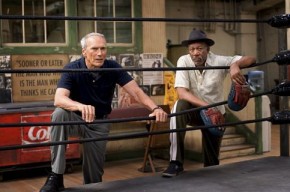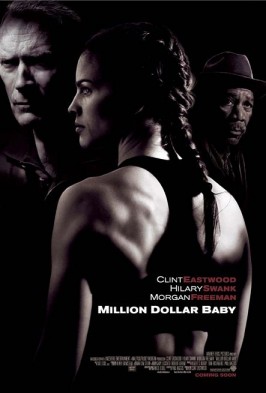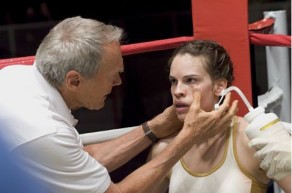|
Million
Dollar Baby
The biggest story this awards season will surround Clint
Eastwood’s knockout left cross sucker punch from seemingly
out of nowhere, Million Dollar Baby. There is just
no two ways about it, this film is a surefire sparkplug
that simply cannot be ignored. Mystic River surprised
a lot of people, but nothing, and I mean nothing, could
possibly prepare you for this film.
On the
surface it looks harmless enough. In fact, on mere pitch
alone it is almost easy to see why a studio like Warner
Brothers would shy away from financing a film whose central
characters are steeped in boxing culture. Add to this the
fact that the central fighter is a female played by Hillary
Swank and you can rest assured that the suits smelled a
“female Rocky” on their hands. The thing they
forgot to factor in is that the man pitching the film was
Clint Eastwood, a man not known to “go quietly in
the night.”
Stepping
aside from the whole scenario, I must be up front and admit
that I’m not, by any means, a huge fan of Clint Eastwood
“the director.” He’s had his share of
hits in my book, but never really seemed to “gel”
for me behind the camera. As an actor, he has the stuff.
I’ve just always put his role as a director as a second
tier move from a screen legend in the business. Never mind
the twenty-plus films he’s directed, it never really
affected me.
Million
Dollar Baby, however, has me rethinking this position.
Granted, his previous work is what it is, and that’s
just not going to change for me. Yet Baby is just
so good that you simply cannot dismiss the man in the chair.
His paws are all over this one and it’s nothing short
of pure cinematic gold.
Let’s
plow through some basic plot points to set up the gist of
the film, because to move past any of the general stuff
would really, truly, rob you of a genuine experience. We
are introduced to “the best ‘cut man’
in the business,” Frankie Dunn (Eastwood), whose latest
fighter “Big Willie” Little (Mike Colter) has
been two bouts away from a title shot for the last two years.
We are given a peek into Frankie’s life and his philosophy
second-hand via his ex-fighter buddy Eddie “Scrap
Iron” Dupris (Morgan Freeman). Eddie runs Frankie’s
gym for him and serves as the narrator for our story. Freeman
is, quite possibly, the best voiceover narrator around,
yet I must admit that I grew concerned that his work here
may fall a bit too close to his work as Red in The Shawshank
Redemption. There is no need for concern whatsoever.
Freeman’s work as Eddie is a complete departure from
his work as Red. Simply put, the two characters couldn’t
be further from one another.
 |
We learn
through a series of events, mostly surrounding his reluctance
to set up a title shot for “Big Willie,” that
Frankie is a protective trainer whose word must be final
because he is unwilling to sway from what he feels is right.
This opening conflict with “Big Willie,” his
interactions with a slick “money man” named
Mickey Mack (Bruce McVittie), and his eventual decision
to leave Frankie for a new trainer and the promise of a
title bout evolve slowly, yet they speak volumes in character.
Films
aren’t made this way anymore. Usually, early conflict
such as this is usually brought full circle in a “physical”
climax in the third act. Here the events within the conflict
shape decisions that the characters must make in the story
to come. For instance, if you stub your toe on something
while running around with no shoes on, you don’t take
an axe to the object you ran into, but the event may encourage
you to walk slower or be more cautious in the future.
Frankie’s
past remains shrouded in deep, painful, secrets. He attends
church more than anyone else in the parish and frequently
engages in biting debates with Father Horvak (Brian O’Byrne)
who insists that the only reason Frankie comes to mass is
to ridicule and harass the young priest. Whenever the ribbing
grows to be too much, Father Horvak asks Frankie whether
he has written his daughter yet, to which Frankie replies
“Everyday.” Horvak believes this to be a lie,
but the pain in Frankie’s eyes tell another story,
as do the letters marked “Return to Sender”
found under his doorstep everyday.
Here
is a safe way to illustrate the kind of depth Baby
exudes without spoiling the meat of the film. Frankie’s
interactions with Father Horvak, his cutting jabs at the
faith, seem to suggest a deeper relationship between the
two characters. Make of it what you will, but it would appear
that Horvak “could have been a contender” but
instead chose to pursue a life within the church. Perhaps
this doesn’t sit well with Frankie; we never even
know if the assumption is true or not, but the implication
exists and like everything else in the film it serves a
deep significance.
Of
course, Frankie is influenced against his will to take up
training tough Maggie Fitzgerald (Hilary Swank). Frankie
initially replies, “Girlie, tough ain’t enough,”
but later decides to give in because she is his only steady
paying fighter at his gym. The decision to shy away from
this development is critical, because expectations are both
met and discarded in Eastwood’s process of telling
his tale.
The
real treasure here is found in the way Eastwood does the
telling, in subtleties. He lets things lie as they are,
and this is a technique that is not often found utilized
by today’s directors. Perhaps some of this stems from
Clint’s own philosophy, or perhaps much of this approach
should be credited to ex-cutman turned author Jerry Boyd,
who under the pen-name F.X. Toole compiled the inspiration
for Million Dollar Baby, a series of short stories
entitled “Rope Burns : Stories From the Corner
.”
Surely
the manner in which Frankie copes was likely shaped from
Boyd’s accounts, but the presentation is what makes
Baby shine, and that credit goes to Eastwood entirely.
Rating:

|








